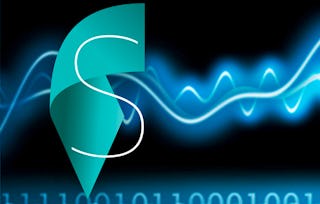Digital Signal Processing is the branch of engineering that, in the space of just a few decades, has enabled unprecedented levels of interpersonal communication and of on-demand entertainment. By reworking the principles of electronics, telecommunication and computer science into a unifying paradigm, DSP is a the heart of the digital revolution that brought us CDs, DVDs, MP3 players, mobile phones and countless other devices.

Digital Signal Processing 3: Analog vs Digital

Digital Signal Processing 3: Analog vs Digital
This course is part of Digital Signal Processing Specialization


Instructors: Paolo Prandoni
14,739 already enrolled
Included with
91 reviews
What you'll learn
The difference between continuous and discrete time
Sampling and interpolation
Quantization, A/D and D/A converters
Multirate signal processing
Skills you'll gain
Details to know

Add to your LinkedIn profile
4 assignments
See how employees at top companies are mastering in-demand skills

Build your subject-matter expertise
- Learn new concepts from industry experts
- Gain a foundational understanding of a subject or tool
- Develop job-relevant skills with hands-on projects
- Earn a shareable career certificate

There are 4 modules in this course
From continuous time to discrete time and vice versa.
What's included
10 videos9 readings1 assignment1 ungraded lab1 plugin
What happens when we sample continuous-time signals and problems we should anticipate.
What's included
5 videos4 readings1 assignment1 plugin
How to change the sampling rate entirely from the discrete-time domain.
What's included
3 videos3 readings1 assignment1 ungraded lab1 plugin
Going from analog to digital, and vice-versa.
What's included
8 videos6 readings1 assignment1 ungraded lab1 plugin
Earn a career certificate
Add this credential to your LinkedIn profile, resume, or CV. Share it on social media and in your performance review.
Instructors

Offered by
Explore more from Electrical Engineering
 Status: Free Trial
Status: Free TrialÉcole Polytechnique Fédérale de Lausanne
 Status: Free Trial
Status: Free TrialÉcole Polytechnique Fédérale de Lausanne
 Status: Free Trial
Status: Free TrialÉcole Polytechnique Fédérale de Lausanne
 Status: Free Trial
Status: Free TrialÉcole Polytechnique Fédérale de Lausanne
Why people choose Coursera for their career

Felipe M.

Jennifer J.

Larry W.

Chaitanya A.
Learner reviews
- 5 stars
90.10%
- 4 stars
7.69%
- 3 stars
0%
- 2 stars
0%
- 1 star
2.19%
Showing 3 of 91
Reviewed on Jan 28, 2022
Excellent continuation to EPFL's DSP series. Mathematically rigorous but highly applicable.
Reviewed on Oct 19, 2022
Excellent course this course is use for Analog to Digital
Reviewed on Jul 6, 2020
Great course with nice examples. However I got stuck on week 3 quiz for a long time which was a little tricky, but otherwise the tests were also good and they checked the concepts well.

Open new doors with Coursera Plus
Unlimited access to 10,000+ world-class courses, hands-on projects, and job-ready certificate programs - all included in your subscription
Advance your career with an online degree
Earn a degree from world-class universities - 100% online
Join over 3,400 global companies that choose Coursera for Business
Upskill your employees to excel in the digital economy
Frequently asked questions
To access the course materials, assignments and to earn a Certificate, you will need to purchase the Certificate experience when you enroll in a course. You can try a Free Trial instead, or apply for Financial Aid. The course may offer 'Full Course, No Certificate' instead. This option lets you see all course materials, submit required assessments, and get a final grade. This also means that you will not be able to purchase a Certificate experience.
When you enroll in the course, you get access to all of the courses in the Specialization, and you earn a certificate when you complete the work. Your electronic Certificate will be added to your Accomplishments page - from there, you can print your Certificate or add it to your LinkedIn profile.
Yes. In select learning programs, you can apply for financial aid or a scholarship if you can’t afford the enrollment fee. If fin aid or scholarship is available for your learning program selection, you’ll find a link to apply on the description page.
More questions
Financial aid available,

